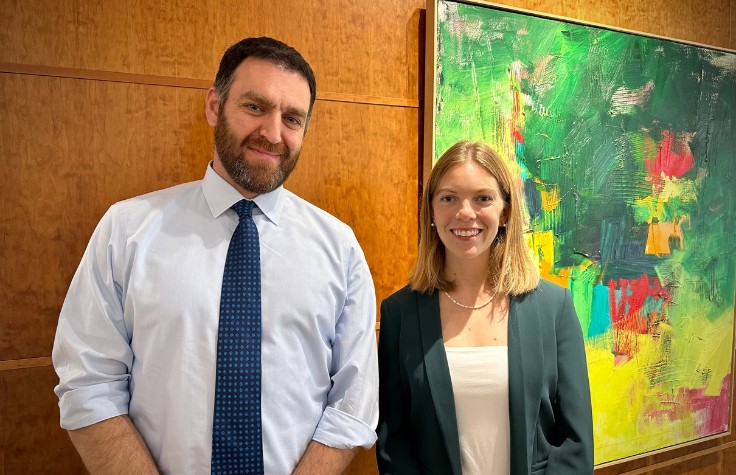Illumina is dedicated to advancing how we predict heritable diseases with the goal of improving early clinical intervention, treatments, and outcomes. We are committed to enabling groundbreaking research that will help populations across all ethnic backgrounds, genders, and social boundaries, large or small.
Polygenic Risk Scores Research Grant Contest
Driving advancements for polygenic risk score-based research

Contest details
Eligible applicants are invited to submit an abstract (maximum of 400 words) for a new project describing the use of the Infinium Global Diversity Array with PRS Content-8 v1.0 Kit along with the Illumina Polygenic Risk Score software–Predict module.
Predict module
Utilize existing scores or ones newly created to generate calculations and risk predictions for a disease or phenotype of interest, with eloquent reporting capabilities to further your research.
Eligibility and requirements
The grant program is open to basic scientists focused on genomics at academic, for profit, or nonprofit institutions
In 400 words or less, provide an overview, a statement of work, and a description of the impact of your research. You may also include up to three figures, with legends, and a list of citations (with 200 word count limit).
Terms and conditions for participants
Publication of project results:
All grant submissions are confidential to the individual submitter and will not be published or distributed, provided, however, Allelica and Illumina may share them with their own staff and distributors, who will not disclose them to third parties. Allelica and Illumina may both support the grant advertising efforts.
The winner will be selected by a panel of judges selected by Allelica and Illumina. The panel may include representatives from Allelica and Illumina. Upon project completion, the grant winner agrees to participate in at least one of the following activities relating to the specific project, with specific details of the applicable activity to be mutually agreed upon in good faith by Allelica, Illumina, and the winner: webinar, case study, blog post, poster presentation, or conference presentation. The winner agrees that Illumina shall have the right to publicly announce the winner’s name and research title and use anonymized data from the winner's projects in application notes including in marketing materials and seminars- no public display of data will happen without prior consent from the winner.
Eligibility and requirements:
- Applicants must be actively enrolled or employed at a research institution in a capacity in which they perform life science research and can analyze samples within 45 days of award notification.
- Applications must be:
- Complete
- An original work
- Applicants must not be a Health Care Professional. Health Care Professionals are not eligible to participate in the program. Health Care Professional is defined as physicians, nurses, physician assistants, pharmacists, and any other medical professionals, including without limitation, medical students, clinical laboratory directors, genetic counselors, and formulary committee members.
- Members of the immediate families of Allelica and Illumina employees and directors, and/or persons living in the same household as such persons, are ineligible to participate in this grant program.
- Also ineligible are (1) residents of Cuba, Iran, North Korea, Sudan, Syria, or any country subject to U.S. embargo; (2) any persons (including businesses, research institutions, government and private organizations, individuals, and other types of legal persons) on the U.S. government’s Denied Persons List, Specially Designated Nationals list, Entity List, Unverified List, or any other similar list maintained by the U.S. government or any other government to whose laws Illumina, Allelica, their subsidiaries or affiliated companies, the scientific challenge, or such person is subject, and all individuals employed thereby or otherwise associated therewith; and (3) any persons for whom it would be illegal to participate in or win the scientific challenge, or with or to whom it would be illegal for Illumina and Allelica to interact or award the prize as contemplated herein.
- This program is void where prohibited or otherwise restricted by law.
- Use of the Prize shall be governed by Illumina standard Terms and Conditions of Sale.
- Applicants agree to obtain all authorizations and permissions from their institution/company that are required to participate in this research grant contest, and if selected, receive the Prize.
Applicants acknowledge and agree that any submission made hereunder, and if selected, the receipt of Prize, is not being made in exchange for any promise of business to Illumina. - You represent that you own or have the right to use and/or transfer any and all Intellectual Property (as subsequently defined) which you use in the submission. Intellectual Property shall include all rights, titles and interest in and to any patent, design, invention, technology, trademark, trade dress, copyright, know-how, trade secret, specification, formula, device, system, method, solution, process, document, result and any other proprietary right, information data or form of intellectual property, in any form, whether protectable by registration or not.
- Researchers working in government organizations, agent or public sectors in markets that fall within the AMEA region of ILMN are not eligible to enter the contest. AMEA is defined to include the following markets: Algeria, Angola, Armenia, Australia, Azerbaijan, Bahrain, Bangladesh, Belarus, Benin, Bhutan, Botswana, Brunei Darussalam, Burkina Faso, Burma/Myanmar, Burundi, Cambodia, Cameroon, Cape Verde, Central African Republic, Chad, Comoros, Cote d'Ivoire, Democratic Republic of the Congo, Djibouti, Egypt, Equatorial Guinea, Ethiopia, Fiji, French Polynesia, Gabon, Gambia, Ghana, Guam, Guinea, Guinea-Bissau, India, Indonesia, Iraq, Japan, Jordan, Kazakhstan, Kenya, Kuwait, Kyrgyzstan, Laos, Lebanon, Lesotho, Liberia, Libya, Madagascar, Malawi, Malaysia, Maldives, Mali, Mauretania, Mauritius, Mongolia, Morocco, Mozambique, Namibia, Nepal, New Caledonia, New Zealand, Niger, Nigeria, North Mariana Islands, Oman, Pakistan, Papua New Guinea, Philippines, Qatar, Republic of the Congo, Russian Federation, Rwanda, Saint Helena, Sao Tome and Principe, Saudi Arabia, Senegal, Seychelles, Sierra Leone, Singapore, Solomon Islands, South Africa, South Korea, Sri Lanka, Sudan, Swaziland, Tajikistan, Tanzania, Thailand, Togo, Tunisia, Turkey, Turkmenistan, Uganda, United Arab Emirates, Uzbekistan, Vanuatu, Vietnam, Wallis and Futuna Islands, Yemen, Zambia, Zimbabwe.
- IN NO EVENT SHALL ILLUMINA, ITS OFFICERS, DIRECTORS, EMPLOYEES, OR AGENTS, BE LIABLE FOR ANY DIRECT, INDIRECT, INCIDENTAL, SPECIAL, PUNITIVE, OR CONSEQUENTIAL DAMAGES WHATSOEVER ARISING UNDER OR AS A RESULT OF ENTRANCE IN OR PARTICIPATION IN THE OFFER, WHETHER BASED ON WARRANTY, CONTRACT, TORT, STRICT LIABILITY, OR ANY OTHER LEGAL THEORY, AND WHETHER OR NOT ILLUMINA IS ADVISED OF THE POSSIBILITY OF SUCH DAMAGES. THE FOREGOING LIMITATION OF LIABILITY SHALL APPLY TO THE FULLEST EXTENT PERMITTED BY LAW.
- ILLUMINA’S TOTAL AND CUMULATIVE LIABILITY ARISING UNDER OR IN CONNECTION WITH THE OFFER SHALL IN NO EVENT EXCEED THE TOTAL VALUE OF THE REAGENTS ELIGIBLE UNDER THE OFFER.
Miscellaneous:
By submitting a grant application, each applicant agrees that Allelica and Illumina may use his or her name, abstract title, for marketing purposes.
All grant applicants agree that Allelica and Illumina may process the personal data he or she provides as part of application, including sharing such data with Illumina’s partners, collaborators and other third parties who are obligated to keep the data confidential, and in accordance with Illumina’s privacy policies.
Applicants agree that Illumina may use applicant’s names, email addresses and affiliated institution to contact applicants for purposes of marketing of its products and services in accordance with the Illumina privacy policy here.
The grant award winner may be required to sign and return an affidavit of eligibility, release of liability, a publicity release, and other appropriate legal documentation reasonably requested by Illumina. No substitution or transfer of the awarded prize is allowed except as permitted by Illumina. The award winner is responsible for any local tax liability (city, state, or federal) occurred by winning and accepting the award. If, for any reason, the grant program may not run as planned for any causes beyond the reasonable control of Illumina, then Illumina reserves the right in its sole discretion to cancel, terminate, modify or suspend the grant program. These terms and conditions and any action related to this grant program will be governed by the laws of the State of California without regard to or application of its conflict of law provisions or your state or country of residence. All claims, legal proceedings or litigation arising in connection with these terms and conditions and this grant program will be brought solely in the federal or state courts located in San Diego County, California, and all applicants consent to the jurisdiction of and venue in such courts and waive any objection as to inconvenient forum. By participating in this grant program, each applicant unconditionally accepts and agrees to comply with and abide by these terms and conditions.
Applicants should include:
- Scientific impact
- Social impact
- Collaborators
- Nations represented
- Technologies used
- Other sources of funding
To be considered, all entries must:
- Be in English
- Be complete
- Be an original work
Judging criteria:
A team of scientists and executives will judge all submissions. Each submission will be judged based on our view of how well the entry reflects scientific merit, innovation, and fit with the values of Illumina.
The award
Applications for the 2023 Illumina Polygenic Risk Scores Research Grant Contest are being accepted. The deadline for all submissions is 11:59 PM PT on July 31, 2023.
One winner will be selected from all qualified applications by a panel of experts, who will rank the applications based on the following criteria:
- Potential impact to human health
- Feasibility
- Prior scientific accomplishments
- Scientific merit
- Novelty
The winner will receive 1008 samples of the Infinium Global Diversity Array with PRS Content-8 v1.0 Kit and accompanying analysis software, valued at over $100,000 USD (Prize). Research proposals that consider biomedical diversity will be prioritized.
Past recipients of the Illumina Polygenic Risk Scores Research Grant

Illumina PRS grant winner investigates genetic linkage between opioid use disorder and chronic pain
Dr Emma Johnson, PhD
Washington University, School of Medicine,
St. Louis, MO
Illumina congratulates Dr Emma Johnson, PhD, Assistant Professor of Psychiatry at Washington University School of Medicine on receiving the 2024 Illumina Polygenic Risk Scores Research Grant. She and her colleagues are using Illumina and Allelica technology to genotype 1000 surgery patients to study the transition from acute to chronic post-surgical pain. This research will develop polygenic risk scores for chronic pain and opioid use disorder to improve pain management and reduce opioid-related risks, addressing a major public health challenge.